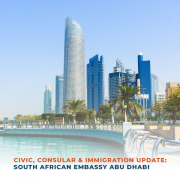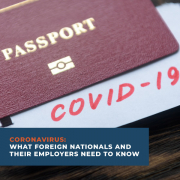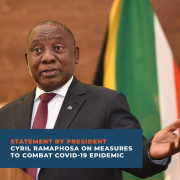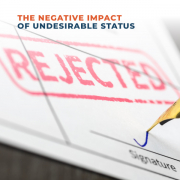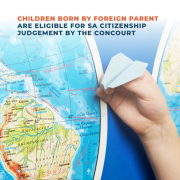Archive for year: 2020
NEWS | CORONAVIRUS: WHAT FOREIGN NATIONALS AND THEIR EMPLOYERS NEED TO KNOW
/in Archived, News /by xp-adminMarisa Jacobs, managing director at Xpatweb, described the situation as “uncharted territory”. She answered some practical questions for employers of foreign nationals.
What should be done when the visas of expatriates from high-risk countries expire while they are in South Africa?
Expatriates from “high-risk” countries currently in South Africa, and whose visas are due to expire, are advised to apply for the extensions of their visas, within South Africa to ensure that they remain compliant.
Some of these renewals, such as inter-company work visa renewals, corporate visa holders and those on short terms business visas; are normally not allowed in South Africa; but these are extraordinary times.
Travel to their home countries will mean they will not be allowed to come back to South Africa, as the foreign South African missions in these “high-risk” countries are prohibited from issuing visas.
This is a special process and must be done through the correct Home Affairs channels, and we recommend that employers start this process as soon as possible.
What should be done when the visas of expatriates from medium risk countries expire while they are in South Africa?
Expatriates from “medium-risk” countries currently in South Africa, and whose visas are due to expire, are equally advised to renew within South Africa.
Whilst the foreign South African missions are allowed to process these applications, there is the requirement of a “certificate of clearance from the virus”, which may cause delay. Also, the employer and expatriate run the risk that medium risk countries may be escalated to high risk. Again, we recommend that the Department of Home Affairs should be approached upfront for special dispensation.
What happens when the passport expires of expatriates from a ‘restricted’ country?
Any passports that have expired or are due to expire, may be renewed at the appropriate Consulate or Embassy within South Africa, and visas currently endorsed into an expired or full passport, will require an application for a ‘transfer of visa’ to be made in order for the visa to be endorsed into the new passport once issued. This can be done in South Africa. Expatriates are reminded to ensure that they apply for passport renewals timeously, as any subsequent visa validity depends on this.
What if a new work visa has been acquired, but the expatriate has not entered South Africa yet?
Any foreign national who has visited high-risk countries in the past 20 days will be denied entry into SA; and travellers from medium-risk countries will be required to undergo “high intensity screening” before entering SA.
Foreign nationals from both “medium- and high-risk” countries who used to enter South Africa visa free, will now be required to apply for a visa to be considered entry to South Africa; this application will require inclusion of a health indication with a “certificate of clearance from the virus”.
Contradicting to the above, and subject to further clarification from the Department, work visas that have been issued from these countries, exclusive of China and Iran, and not yet activated through ports of entry, have not been revoked or cancelled. However, these nationals remain banned from South Africa until same has been lifted.
We recommend that an upfront confirmation process be adopted with the Department of Home Affairs or relevant Foreign Mission, as opposed to ‘fingers crossed’ that entry will be allowed.
What about if the expatriate is on home leave, in a ‘medium- and high-risk’ country?
The Minister of the Department of Home Affairs indicated that flights are subject to an “advanced passenger process” whereby a passenger log of each flight is submitted to the Department and undergoes a verification process between the travel origin and connecting flights for each passenger coming to South Africa.
This will undergo further review before disembarkation into South Africa to assess if any passengers may not be permitted to enter South Africa.
We recommend contact is made prior to making travel arrangements to ensure entry into the country will be allowed. Employers and expatriates should take special note hereof and make sure that they get clearance upfront, thus not risk being stranded in a system, currently in a state of flux.
For expatriates about to start the process of new work visas
Where new resources are required for business and/or for projects purposes, it is recommended that the expatriate, supported by the South African employer, still immediately proceed with the preparation (and filing where possible) of the required work visa application(s) until further instructions have been received by the Department of Home Affairs. No one knows how long these measures will apply and with less travel visas issued; this is an opportune time to start the process.
Though restrictions have been imposed on the travel of foreign nationals from “medium- and high-risk” countries, the actual filing of visa applications have not been impacted in all countries. Understandably, as the economic impact of these restrictions must be limited, so it makes sense to use this period to get necessary approvals now. This prevents being caught in an expected rush later when restrictions are lifted and allows business to get back to normal as soon as restrictions are over.
Special cases: the UK is now closed, China remains open
The VFS office in the United Kingdom is now formally closed, however, China remains open for applications.
Where sufficient business or personal cases exist, employers and expatriates caught by these closures, often immediate and unexpected, can always approach the Department of Home Affairs directly through the correct channels. There is also always a discretion of the South African Embassy, and until clear instructions have been received by them from the Department.
Where applications are being processed, applicants will be in a position to make the required arrangements in order to proceed with travel to South Africa as soon as the travel bans have been uplifted.
Again, it is therefore imperative that applications are not delayed but filed (where permitted) as soon as possible as we expect an influx of applications once the travel bans are uplifted and some advance planning will ensure you are ahead of the rush.
Source: Fin24
NEWS | STATEMENT BY PRESIDENT CYRIL RAMAPHOSA ON MEASURES TO COMBAT COVID-19 EPIDEMIC
/in Archived, News /by xp-adminGiven the scale and the speed at which the virus is spreading, it is now clear that no country is immune from the disease or will be spared its severe impact. Never before in the history of our democracy has our country been confronted with such a severe situation. From the start of the outbreak in China earlier this year, the South African government has put in place measures to screen visitors entering the country, to contain its spread and to treat those infected.
As of now, South Africa has 61 confirmed cases of people infected with the virus, and this number is expected to rise in the coming days and weeks. Initially, it was people who had travelled out of the country, especially from Italy, who had positively tested for the virus. It is concerning that we are now dealing with internal transmission of the virus. This situation calls for an extraordinary response; there can be no half measures. Cabinet held a special meeting earlier today. After which, due to the serious measures we are going to announce, I have consulted the premiers.
We have decided to take urgent and drastic measures to manage the disease, protect the people of our country and reduce the impact of the virus on our society and on our economy. We have now declared a national state of disaster in terms of the Disaster Management Act. This will enable us to have an integrated and coordinated disaster management mechanism that will focus on preventing and reducing the outbreak of this virus.
We will also be able to set up emergency, rapid and effective response systems to mitigate the severity of its impact. Following an extensive analysis of the progression of the disease worldwide and in South Africa, Cabinet has decided on the following measures: Firstly, to limit contact between persons who may be infected and South African citizens.
We are imposing a travel ban on foreign nationals from high-risk countries such as Italy, Iran, South Korea, Spain, Germany, the United States, the United Kingdom and China as from 18 March 2020.
We have cancelled visas to visitors from those countries from today and previously granted visas are hereby revoked.
South African citizens are advised to refrain from all forms of travel to or through the European Union, United States, United Kingdom and other identified high-risk countries such as China, Iran and South Korea. This is effective immediately. Government will continue to regularly issue travel alerts referring to specific cities, countries or regions as the situation evolves based on the risk level.
Any foreign national who has visited high-risk countries in the past 20 days will be denied a visa.
South African citizens returning from high-risk countries will be subjected to testing and self-isolation or quarantine on return to South Africa. Travellers from medium-risk countries – such as Portugal, Hong Kong and Singapore – will be required to undergo high intensity screening.
All travellers who have entered South Africa from high-risk countries since mid-February will be required to present themselves for testing. We will strengthen surveillance, screening and testing measures at OR Tambo, Cape Town and King Shaka International Airports South Africa has 72 ports of entry in the country which are land, sea and air ports.
Of the 53 land ports, 35 will be shut down with effect from Monday 16 March. Two of the 8 sea ports will be closed for passengers and crew changes. Effective immediately, all non-essential travel for all spheres of government outside of the Republic is prohibited We further discourage all non-essential domestic travel, particularly by air, rail, taxis and bus.
Secondly, it is essential therefore that we minimise the risk of the spread of this virus by limiting contact amongst groups of people. While we appreciate the economic, religious, and cultural significance of social and community gatherings, the coronavirus is spread through contact between persons. As we have said before, the current circumstances require extraordinary measures to curb the spread of infections. Countries that have heeded the call to implement these radical measures, have fared much better than those than do not.
Therefore to encourage social distancing Cabinet has decided on these additional measures:
Gatherings of more than 100 people will be prohibited. Mass celebrations of upcoming national days such as Human Rights Day and other large government events will be cancelled.
Where small gatherings are unavoidable, organisers will need to put in place stringent measures of prevention and control. Schools will be closed from Wednesday, 18 March, and will remain closed until after the Easter Weekend. To compensate, the mid-year school holidays will be shortened by a week. Government is working closely with colleges, universities and other public facilities such as Parliament, prisons, police stations and military installations to intensify hygiene control.
Visits to all correctional centres are suspend for 30 days with immediate effect. Government is aware of the confirmed case of a student who has tested positive for the coronavirus at Wits University. Those who have been in contact with the student will be quarantined.
The Minister of Higher Education, Science and Innovation is consulting with Vice Chancellors of universities and colleges across the country and will soon be announcing measures in this regard.
We call on all businesses including mining, retail, banking, farming to ensure that they take all necessary measures to intensify hygiene control. We also call on the management of malls, entertainment centres and other places frequented by large numbers of people to bolster their hygiene control.
Thirdly, to further strengthen our health response: Government is strengthening its surveillance and testing systems. We are in process of identifying isolation and quarantine sites in each district and metro. Capacity is being increased at designated hospitals in all provinces. We are also increasing the capacity of existing contact tracing processes. We are partnering with the private sector to set up a national tracking, tracing and monitoring system of all people infected with the coronavirus and those they have been in contact with We are undertaking a mass communication campaign on good hygiene and effective prevention behaviour.
Therefore, we are calling on everyone to:
- Wash their hands frequently with soap and water or hand sanitisers for at least 20 seconds;
- Cover their nose and mouth when coughing and sneezing with tissue or flexed elbow;
- Avoid close contact with anyone with cold or flu-like symptoms.
In essence, we are calling for a change of behaviour amongst all South Africans.
We must minimise physical contact with other people, and, encourage the elbow greeting rather than shaking hands. Because of the severity of this virus and its rapid spreading, government will make funding available to capacitate the sectors dealing with the national response to the Coronavirus outbreak.
Since the outbreak of this pandemic, our government’s response has been led by an Inter-Ministerial Committee, chaired by the Minister of Health, Dr Zweli Mkhize. We congratulate them on the outstanding work they have done – together with their able support teams – to steer our country through this challenging and un-certain period. As part of the intensification of this effort, we have decided to establish a National Command Council chaired by the President.
This Command Council will include, amongst others, members of the Inter- Ministerial Committee and will meet three times a week, to coordinate all aspects of our extraordinary emergency response. My fellow South Africans, In addition to the impact that this pandemic will have on health and wellbeing of our people, and the impact it will have on the day-to-day life of our society, COVID-19 will also have a significant and potentially lasting impact on our economy.
In the last few weeks, we have seen a dramatic decline in economic activity in our major trading partners, a sudden drop in international tourism and severe instability across all global markets.
The anticipated effects of the decline in exports and tourist arrivals will be ex-acerbated by both an increase in infections and the measures we are required to take to contain the spread of the disease.
This will have a potentially severe impact on production, the viability of businesses, job retention and job creation.
Cabinet is therefore in the process of finalising a comprehensive package of interventions to mitigate the expected impact of COVID-19 on our economy. This package, which will consist of various fiscal and other measures, will be concluded following consultation with business, labour and other relevant institutions. It is clear that this disease will be extremely disruptive. Our priority must be to safeguard the health and well-being of all South Africans, to minimise the number of infections and to ensure all those infected get proper treatment. While we are battling a contagious virus, perhaps the greatest dangers to our country at this time are fear and ignorance.
We must appreciate the extent of the threat that this disease presents, we must accept the anxiety that it causes, but we cannot allow ourselves to be overwhelmed by fear and panic. We should stop spreading fake and unverified news and create further apprehension and alarm. While we are facing a medical emergency far graver than we have experienced in recent times, we are not helpless.
We have the knowledge, the means and the resources to fight this disease. If we act swiftly, with purpose and collectively we can limit the effects of the coronavirus on our people and our country.
Although we may be limiting physical contact, this epidemic has the potential to bring us closer together. We are responding as a united nation to a common threat. This national emergency demands cooperation, collaboration and common action. More than that, it requires solidarity, understanding and compassion.
Those who have resources, those who are healthy, need to assist those who are in need and who are vulnerable. All the institutions of the state will be mobilised to lead this effort, but, if we are to succeed, every company, trade union, NGO, university, college, school, religious group and taxi association will need to play its part.
We thank those people who suspected they may have been exposed to the virus for coming forward to be tested and for taking measures – such as self-isolation – to prevent further transmission. We thank the medical teams around the country who are leading our response and are putting the well-being of others ahead of the risks they face themselves. On Saturday we welcomed 104 of our compatriots who were in Wuhan City, China.
We thank the repatriation team for the task they performed with pride and efficiency to return them to the country and ultimately to their families. The repatriation has been successful and those who have returned have settled in the quarantine area. We thank the military health officials, pilots, cabin crew and all those who participated in this exercise. We thank the leadership and the people of Polokwane and Limpopo for warmly welcoming our fellow South Africans.
We also extend our gratitude to the staff and management of the Ranch Hotel who have accommodated our compatriots and also subjected themselves to quarantine. We extend our appreciation too to the companies, organisations and individuals who have taken it upon themselves to disseminate information about this virus and to raise awareness. We thank those businesses that have taken steps to protect their employees, and those unions that have taken steps to protect their members.
Ministers who are at the frontline of coordinating our response to this crisis will be briefing the nation tomorrow, where they will unpack details in relation to the measures we announced tonight.
Fellow South Africans, This is the most definitive Thuma Mina moment for our country. I have great trust that our people will respond positively to this call to common action.
Fellow South Africans, This epidemic will pass. But it is up to us to determine how long it will last, how damaging it will be, and how long it will take our economy and our country to recover. It is true that we are facing a grave emergency. But if we act together, if we act now, and if we act decisively, we will overcome it. I thank you.
Source: The Presidency
NEWS | THE NEGATIVE IMPACT OF UNDESIRABLE STATUS
/in Archived, News /by xp-adminAccording to South African Immigration Act, a foreigner may, therefore, be declared undesirable by the Director-General of Home Affairs if he or she has overstayed his or her South Africa visa.
Regulation 27(3) stipulates that a person who overstays after the expiry of his or her visa will be declared as ‘undesirable’. The period of the declaration is determined by establishing the number of foreign national’s period of overstay in the Republic.
A declaration of undesirability status effectively precludes you from applying for a visa and re-entering the Republic for the specified periods of time, as set out in the Regulation:
- In the case of a person who overstays for a period not exceeding 30 days, be declared undesirable for a period of 12 months
- In the case of a person who overstays for the second time within the period of 24 months, be declared undesirable for a period of two years
- In the case of a person who overstays for more than 30 days, be declared undesirable for a period of five years
Poor Promulgation of the Regulation blamed for the Increase of Undesirable Cases
Lately there has been an increase of foreigners who have already submitted the extension of their visa application and have attempted to return to their country of residence and were declared undesirable upon departure. In the past the foreigners could get away with this, with just producing an original acknowledgement of receipt and proof of payment to the official at the Port of Entry upon their arrival and departure. The change in regulation has been poorly publicised and as a result, many foreigners have attempted to depart the country only to be declared an undesirable person upon doing so.
In the case of Johnson and Others v Minister of Home Affairs and Others; InRe: Delorie and Others v Minister of Home Affairs and Another (10310/2014, 10452/2014) [2014] ZAWCHC 101 (30 June 2014) the Western Cape High Court considered the effect of Section 30 (1) (h), Regulation 27 (3) and the directive on two families separated due to declarations of undesirability.
The Johnson case concerned Louise Henrikson Egedal-Johnson a Danish national has been married to Brent Johnson a South African national since 2009 and had one child. Egedal-Johnson has been on a Relatives visa since her marriage to Johnson. The visa was issued 28 February 2012 and expired 27 February 2014. On February 10, Egedal-Johnson applied for the extension of her Relavise visa. On 28 May 2014 her visa application was not adjudicated, and she left South Africa from Cape Town International Airport together with her husband. Ongoing through passport control she was declared an undesirable person and was issued with a form declaring her as undesirable person on the basis that she had overstayed her permit by a period of 90 days. On their return to Cape Town she was refused entry at the Cape Town International Airport and subsequently detained by officials on the basis that she had been declared an undesirable person. She was subsequently deported to her country, Denmark, together with the parties’ child.
Egedal-Johnson on behalf of his family applied for urgent relief from the Western Cape High Court. Judge James Yekiso made the following key findings: Shortly before Egedal-Johnson and Henderson had departed the country on May 28, the immigration laws relating to undesirable people had fundamentally changed and the introduction of section 30 (1) (h) meant that foreigners who overstayed on expired permits could be declared as undesirable.
Their statuses meant that Egedal-Johnson, Henderson and their respective families were suffering prejudice. It was held that their statuses be suspended, thus they were permitted to enter and remain in the country.
Appealing the Decision
The major issue is the delays and backlogs faced by the Department of Home Affairs, basically leaving foreigners stuck in their country of residence until they have received an outcome on their applications.
In the event that you are required to travel out of South Africa and you are declared undesirable, you have 10 working days within which to submit a written representations accompanied by supporting documents appealing the decision.
The formal appeal process provides the aggrieved party with an opportunity to convince the Department why their status of undesirability should be removed. One has to provide the Department with a substantial reason in order to change their undesirability status.
The following important factors are considered when one submits their formal written representations to the Department:
- A medical condition that would not allow the person to travel
- A foreigner visiting their family member
- A pending visa or passport application
- Any other personal circumstance that will support the application
These representations can be submitted to the Department of Home Affairs and it is also highly recommended that one should enlist the service of a professional immigration practitioner or attorney to assist. Since the process is quite tedious, the Department will need to conduct certain investigations in order to determine one’s innocence in this matter and if you do not submit an appeal that is compliant with the Act – a delayed or negative outcome is inevitable.
AUTHOR 
Lerato Mahupela
Immigration Specialist
NEWS | CHILDREN BORN BY FOREIGN PARENT ARE ELIGIBLE FOR SA CITIZENSHIP, JUDGEMENT BY THE CONCOURT
/in Archived, News /by xp-adminDespite South Africa passing their first Citizenship Act no. 88 of 1995, it was discovered in 2010 that the Act made no provisions for children born to foreign parents in South Africa.
In terms of Section 4 (3) of the amended Act stated that: “A child born in the Republic of parents who are not South African citizens or who have not been admitted into the Republic for permanent residence, qualifies to apply for South African citizenship upon becoming a major if –
- He or she has lived in the Republic from the date of his or her birth to the date of becoming a major; and
- His or her birth has been registered in accordance with the provisions of the Births and Deaths Registration Act of 1992
Even though the Citizenship Act of South Africa was amended in 2010, it came only into operation in 1 January 2013. In government you cannot pass an Act without its Regulations this means that even if the Act was passed, the applicants could not apply because they do not know the modus operandi of applying. Failure of the Minister of Home Affairs (Aaron Motsoaledi) to promulgate regulations for the applications for citizenship in terms of Section 23 of the Act led to the decision of the High Court ordering the Minister to accept applications on affidavits.
Initially the case was first taken to the Western Cape High Court where the Minister argued that the five applicants did not fall under the terms of the Amended Act because they were not born before 2013. The case was appealed at the Supreme Court, where the applicants were regarded to have been treated unfairly by the Department of Home. The judge remained by the decision of the Western Cape Court.
Ordinarily when a child turns of major age, they automatically acquire status of their parents. However when the applicants represented in Legal Resource Centre reached 18 years after 2013 and approached the Department of Home Affairs to apply for Citizenship, they were told that the Citizenship Act does not apply retrospectively – meaning that it only applied to children born after the Act was enacted on 1 January 2013.
The recent judgement released on the 13 of February 2020 by the Constitutional Court orders that Department of Home Affairs declare that Section 4(3) of the Citizenship Act is applicable to persons who meet requirements irrespective of whether they were born before or after in 1 January 2013 and requests that Department of Home Affairs develop regulations to the Citizenship Act within a year and accept the prejudice to the applicants who cannot apply for citizenship involves not only practical implications but also fundamental constitutional entitlements.
In his interview with eNCA (27 February 2020), the Minister explained that the judgement allows application by affidavit until the Department put in place its Regulations. He expressed his disappointment by saying that this was quite unfortunate as this four-year legal battle could have been avoided if his legal team adhered to the order of High Court. Nevertheless, he undertook to take some disciplinary actions against certain people in his Department for dealing with this matter carelessly.
There are three ways in which a person can be a citizen according to the Eighth Amended Act of the of the South African Citizenship Act of 1995 that came into operation on 1 April 2003:
- By birth
- By descent
- By naturalisation
Citizenship by birth and descent are legal rights for anyone who can prove the facts of birth and parentage. Citizenship by naturalisation is not a legal right. It can be granted or refused by the Minister of Home Affairs.
AUTHOR 
Lerato Mahupela
Immigration Specialist
FIND US
Johannesburg
17 Eaton Avenue,
Bryanston, Johannesburg,
Gauteng, 2191
South Africa
George
55 York Street
Dormehls Drift
George, 6529
South Africa
CONTACT US
Telephone:
South Africa: 011 467 0810
Postal:
PO BOX 35046
Northcliff
2115
IN THE NEWS
- Another Positive Move To Attract More Tourists To SA
- Bringing in the Bomb Squad at Home Affairs
- How Home Affairs’ Immigration Reforms Could Drive SA’s Growth in 2025
- Phindiwe Mbhele on Remote Work Visa: Splendid Cape Town is wooing more and more digital nomads
- Cape Town Shines, and So Does South Africa’s New Critical Skills Visa Overhaul

